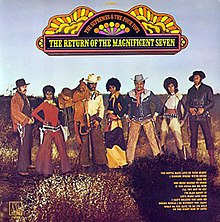The Return of the Magnificent Seven is the second collaborative album between Motown label-mates The Supremes and Four Tops, released in 1971.
| The Return of the Magnificent Seven | ||||
|---|---|---|---|---|
 | ||||
| Studio album by | ||||
| Released | July 13, 1971 | |||
| Recorded | 1970 | |||
| Genre | Soul | |||
| Label | Motown | |||
| Producer | Frank Wilson | |||
| The Supremes chronology | ||||
| ||||
| The Four Tops chronology | ||||
| ||||
Critical reception
edit| Review scores | |
|---|---|
| Source | Rating |
| AllMusic | [1] |
| Cashbox | (Favorable)[2] |
| The Encyclopedia of Popular Music | [3] |
In a contemporary review Cashbox published:[2]
'What was that you were saying about supergroups and supersessions? Give a listen to what may be the last word on the subjects. Joining together of these two dynamic groups results in an LP which is chock full of excitement and charm. "You Gotta Have Love In Your Heart" kicks the set off and it's non-stop action all, the way through as the seven take on a bevy of new songs, along with the standard "Call Me." Should find a ready following among fans of both groups.'
Track listing
edit- "You Gotta Have Love in Your Heart" (Nick Zesses, Dino Fekaris)
- "I Wonder Where We're Going" (Tom Baird)
- "Call Me" (Tony Hatch)
- "One More Bridge to Cross" (Nickolas Ashford, Valerie Simpson)
- "If You Could See Me Now" (Janie Bradford, Joe Hinton, Henry Cosby)
- "I'll Try Not to Cry" (Nick Zesses, Dino Fekaris)
- "I'm Glad About It" (Nickolas Ashford, Valerie Simpson)
- "Let's Make Love Now" (Nick Zesses, Dino Fekaris)
- "I Can't Believe You Love Me" (Harvey Fuqua, Johnny Bristol)
- "Where Would I Be Without You Baby" (Clarence McMurray, Martin Coleman)
- "What Do You Have to Do (To Stay on the Right Side of Love)" (Pam Sawyer, Leon Ware)
Personnel
edit- Jean Terrell - vocals
- Mary Wilson - vocals
- Cindy Birdsong - vocals
- Levi Stubbs - vocals
- Abdul "Duke" Fakir - vocals
- Lawrence Payton - vocals
- Renaldo "Obie" Benson - vocals
- Frank Wilson - producer, executive producer
- The Funk Brothers - instrumentation
- David Van DePitte, Henry Cosby, Paul Riser, Tom Baird - arrangers
Chart history
edit| Chart (1971) | Peak position |
|---|---|
| US Billboard 200[4] | 154 |
| US Top R&B/Hip-Hop Albums (Billboard)[5] | 18 |
| US Record World[6] | 72 |
| US Record World R&B[7] | 20 |
References
edit- ^ The Return of the Magnificent Seven at AllMusic
- ^ a b "Pop Picks" (PDF). Cashbox. June 12, 1971. p. 31. Retrieved 2 January 2022.
- ^ Colin Larkin (27 May 2011). The Encyclopedia of Popular Music. Omnibus Press. p. 1229. ISBN 9780857125958. Retrieved 26 January 2021.
- ^ "The Supremes Chart History (Billboard 200)". Billboard. Retrieved 1 January 2020.
- ^ "The Supremes Chart History (Top R&B/Hip-Hop Albums)". Billboard. Retrieved 1 January 2020.
- ^ "THE ALBUM CHART: Week of July 24, 1971" (PDF). Record World. worldradiohistory.com. July 24, 1971. Retrieved 29 January 2021.
- ^ "THE R&B ALBUM CHART: Week of July 17, 1971" (PDF). Record World. worldradiohistory.com. July 17, 1971. p. 39. Retrieved 29 January 2021.